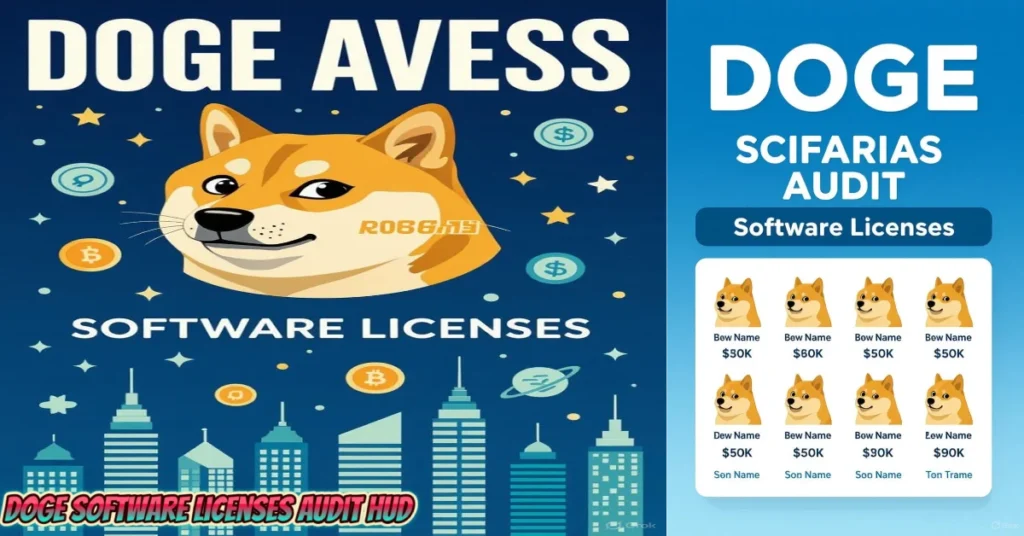In the fast-paced world of technology, software compliance can feel like a daunting task. With multiple licenses to manage and an ever-evolving landscape of regulations, businesses often find themselves in murky waters when it comes to software usage. Enter the Doge Software License Audit HUD—your new best friend for navigating these complexities. This tool not only streamlines your license management but also acts as a safety net against legal repercussions that arise from non-compliance.
Understanding how to leverage this powerful resource is crucial for any business aiming to stay ahead in today’s digital age. Whether you’re a seasoned entrepreneur or just starting out, knowledge about software audits can save you time, money, and headaches down the line. Let’s dive deeper into why regular license audits are essential and how the Doge Software License Audit HUD can make your life easier!
Understanding the Importance of License Audits for Businesses
License audits play a crucial role in the software landscape for businesses. They ensure that companies comply with licensing agreements, which can often be complex and confusing.
Without regular audits, organizations may unknowingly use unlicensed software. This not only poses legal risks but can lead to significant financial penalties as well.
Additionally, compliance through license audits helps optimize software usage. Businesses can identify unused licenses or those that are underutilized and adjust their purchases accordingly.
Staying proactive with license management fosters trust among stakeholders and partners. It reflects a commitment to ethical practices and responsibility in digital stewardship.
As regulations around software usage become stricter, understanding the nuances of license auditing is more critical than ever for sustainable business operations.
Common Pitfalls and Risks of Not Conducting Regular License Audits
Neglecting regular license audits can lead to significant financial repercussions. Companies often find themselves unexpectedly facing hefty fines for non-compliance with software licensing agreements.
Another risk is the potential for operational disruptions. Without proper oversight, businesses may unknowingly use unlicensed software, leading to unexpected shutdowns or legal actions that could halt operations entirely.
Moreover, a lack of auditing creates vulnerabilities in data security. Non-compliant software can expose organizations to cyber threats and breaches, jeopardizing sensitive information.
Additionally, failing to track licenses accurately can create confusion within teams about what’s authorized versus unauthorized usage. This disorganization not only affects productivity but can also damage team morale as employees navigate through unclear policies.
Companies might miss out on opportunities for cost savings by overlooking unused or underutilized licenses during an audit review. Regular assessments provide insights into optimizing resources effectively.
Tips for Preparing for a Doge Software License Audit
Preparing for a Doge Software License Audit requires meticulous attention to detail. Start by gathering all relevant documentation. This includes purchase agreements, licenses, and any correspondence with vendors.
Next, assess your current software usage against what you are licensed for. Create a comprehensive inventory of all software applications in use across the organization.
Engage your IT team to assist in identifying unauthorized or outdated software installations. This will help pinpoint potential compliance issues before they arise during the audit.
Make sure everyone involved understands their role in the process. Clear communication can streamline preparations and ensure that no critical information is overlooked.
Consider conducting an internal audit prior to the official review. This proactive measure can reveal discrepancies and provide time for corrective actions if needed. Being prepared not only eases stress but also enhances compliance readiness.
Best Practices for Managing Licenses and Compliance with the HUD
Maintaining compliance with the Doge Software License Audit HUD requires a proactive approach. Start by creating a centralized license management system. This helps track all software licenses in one place, reducing confusion and potential oversights.
Regularly update your records. Keep an eye on renewal dates and usage metrics to avoid unexpected lapses or over-licensing issues. Automated tools can simplify this task, providing alerts when action is needed.
Training employees is essential for compliance culture. Ensure that staff understands licensing agreements and the importance of adhering to them.
Conduct regular internal audits to identify any discrepancies early. Spotting issues before an official audit can save time and resources down the line.
Establish clear communication with software vendors. Building strong relationships ensures you remain informed about any changes in licensing terms or requirements as they arise, keeping your business ahead of potential complications.
Case Studies: Real-Life Examples of Companies Facing Consequences for Non-Compliance
Several companies have faced significant repercussions due to non-compliance with software licenses. One notable case involved a large financial institution that neglected to conduct regular audits. When the company finally did, they discovered thousands of unlicensed copies of critical software in use. The result? A hefty fine and damage to their reputation.
Another example is a tech startup that underestimated its licensing requirements for third-party tools. They were caught during an unexpected audit and ended up paying substantial penalties, which could have been avoided with proper management practices.
In both instances, these organizations not only dealt with financial setbacks but also lost valuable trust from clients and partners. These real-life scenarios serve as cautionary tales about the importance of adhering to license agreements in any business environment.
Conclusion: The Benefits of Proactive License Management in Today’s Digital
Effective license management is more critical than ever in our digital world. The Doge Software License Audit HUD empowers businesses to stay compliant and avoid costly penalties. By adopting proactive measures, companies can mitigate risks associated with software licensing.
Engaging in regular audits helps identify potential discrepancies before they escalate into significant issues. This not only saves money but also fosters a culture of accountability within the organization. Proactive license management ensures that teams are aware of their responsibilities regarding software use.
As technology continues to evolve, so do the complexities of software licenses. Companies that embrace these changes with diligence will be better positioned for success. Investing time and resources into managing licenses effectively leads to enhanced operational efficiency and peace of mind amidst an increasingly regulated environment.






